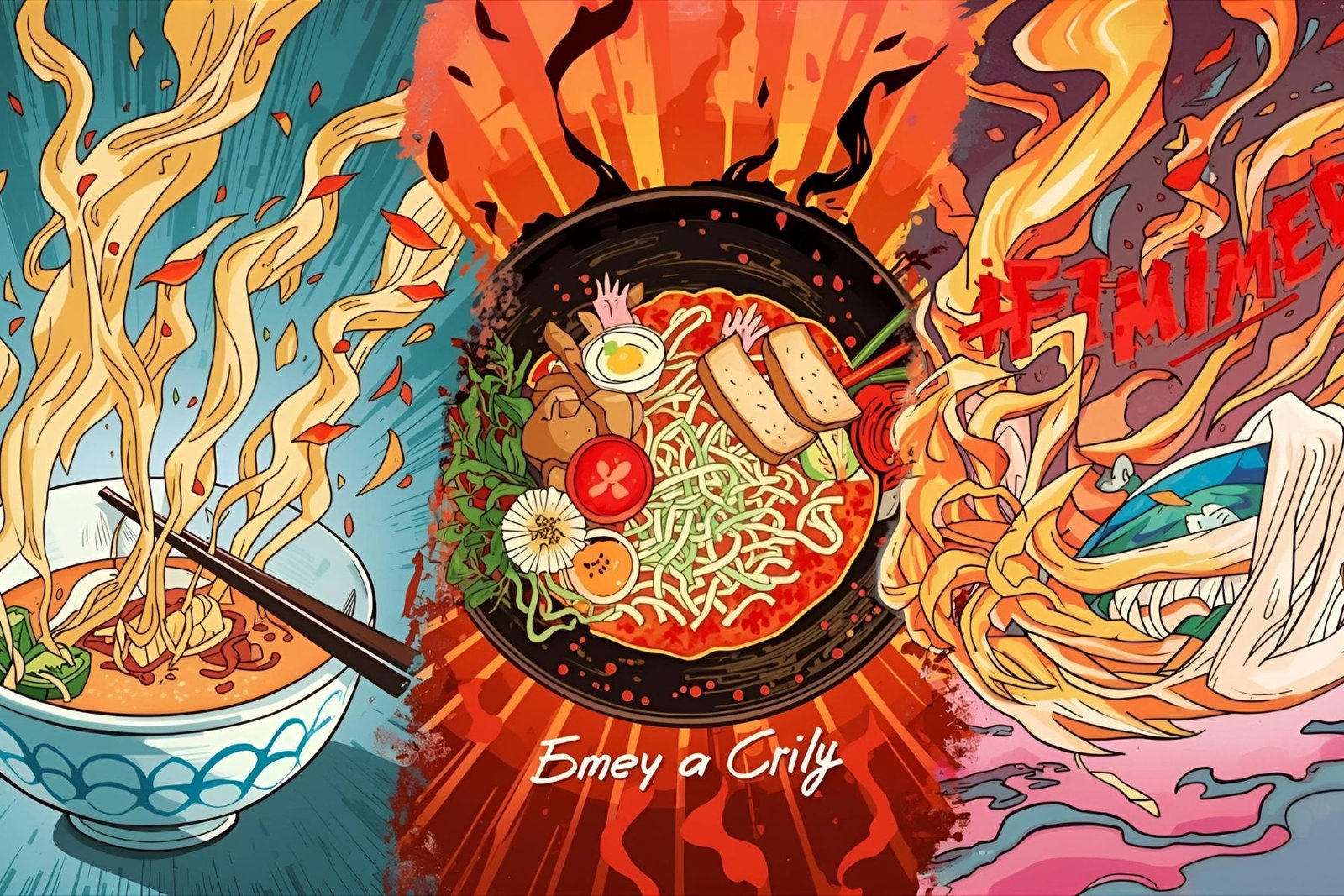
The culinary landscape has witnessed countless food trends, but none quite as transformative as GenZ’s ramen obsession. This generation, born between 1997 and 2012, has elevated the humble instant noodles from a college dorm staple to a cultural phenomenon that’s reshaping how we think about comfort food, creativity, and culinary expression.
What started as an affordable meal solution has evolved into something far more sophisticated and culturally significant. Generation Z has taken ramen culture and infused it with their signature blend of creativity, social consciousness, and digital-native thinking. Their approach to this beloved Japanese cuisine goes beyond mere sustenance – it’s become a canvas for self-expression, a tool for building community, and a bridge between traditional flavors and modern innovation.
The ramen trend among young adults isn’t just about the food itself; it’s about what ramen represents in their lives. For GenZ, bowl aesthetics, noodle art, and ramen photography have become integral parts of their food experiences. They’ve transformed simple comfort food into Instagram-worthy masterpieces, created entirely new fusion recipes, and built thriving communities around their shared passion for these versatile noodles.
This comprehensive exploration will unveil five remarkable ways GenZ’s relationship with ramen is completely revolutionizing our food culture, from their innovative cooking techniques to their impact on the global food industry. Prepare to be amazed by how this generation has turned a simple bowl of noodles into a powerful cultural force.
1. Social Media Transformation: When Noodles Become Content Gold
The Rise of Ramen Influencers and Viral Food Content
GenZ’s ramen obsession has found its perfect platform in social media, where ramen photography and food content creation have reached unprecedented levels of creativity. Young food enthusiasts are no longer just eating their meals – they’re crafting visual narratives around every bowl they create.
The transformation of ramen culture through social media platforms like TikTok, Instagram, and YouTube has been nothing short of revolutionary. Ramen influencers now command millions of followers, sharing everything from quick cooking hacks to elaborate gourmet ramen preparations that rival professional chef presentations. These content creators have turned bowl aesthetics into an art form, with carefully curated lighting, props, and styling that make even the simplest instant noodles look like culinary masterpieces.
The Psychology Behind Ramen’s Social Media Success
What makes ramen content so compelling to Generation Z goes deeper than just visual appeal. The process of preparing and presenting ramen offers the perfect combination of accessibility and creativity that resonates with this generation’s values. Unlike elaborate cooking projects that require expensive ingredients and professional equipment, ramen allows young creators to experiment with fusion flavors, creative toppings, and innovative presentation techniques using affordable, readily available ingredients.
The comfort food aspect of ramen also provides emotional connection in content creation. Young adults share their ramen recipes not just as food tutorials, but as personal stories, late-night study companions, and celebration meals. This emotional authenticity combined with visual creativity has made ramen trends some of the most engaged-with content across all major social platforms.
2. Culinary Innovation: Redefining Traditional Boundaries
Fusion Flavors That Break All the Rules
GenZ’s ramen obsession has unleashed a wave of culinary creativity that’s completely redefining what ramen can be. This generation approaches traditional Japanese cuisine with respect but without reverence for rigid rules, creating fusion recipes that blend cultural flavors in ways that would have been unthinkable just a decade ago.
Young cooks are experimenting with Korean-inspired ramen featuring kimchi and gochujang, Mexican fusion variations with jalapeños and lime, and even Indian-spiced ramen incorporating curry powders and tandoori flavors. These innovative approaches to noodle dishes demonstrate GenZ’s global perspective on food culture and their willingness to create new traditions rather than simply follow existing ones.
The Science of Flavor Experimentation
The cooking techniques employed by GenZ ramen enthusiasts often involve sophisticated understanding of flavor profiles and ingredient interactions. They’ve developed methods for creating complex broths using unconventional ingredients, perfecting egg cooking techniques for that Instagram-perfect soft yolk, and mastering the art of creative toppings that provide both visual impact and flavor enhancement.
This generation has also embraced the concept of meal customization in ways that go far beyond traditional ramen preparation. They understand that food trends aren’t just about following recipes – they’re about creating personalized experiences that reflect individual tastes, dietary needs, and creative expression.
3. Economic Impact: The Billion-Dollar Noodle Economy
How GenZ Spending Habits Are Reshaping the Food Industry
The economic implications of GenZ’s ramen obsession extend far beyond individual meal choices. This generation’s spending patterns have created new market segments, influenced product development across the food industry, and generated entirely new business models centered around ramen culture.
Food brands have taken notice of GenZ’s approach to comfort food, leading to the development of premium instant noodles lines, artisanal broth concentrates, and gourmet topping kits that cater to young consumers’ desire for both convenience and quality. The ramen market has expanded to include everything from subscription boxes delivering international noodle varieties to specialized kitchenware designed specifically for ramen preparation and presentation.
The Rise of Ramen-Centric Businesses
Restaurants and food service businesses have adapted their models to capture GenZ’s ramen enthusiasm. Ramen bars now offer customization options that rival coffee shops, allowing customers to build their perfect bowl with dozens of broth, noodle, and topping combinations. Food trucks specializing in gourmet ramen have become increasingly popular, and even high-end restaurants have added sophisticated ramen dishes to their menus to attract younger demographics.
The food delivery sector has also been significantly impacted, with ramen-focused ghost kitchens and specialized delivery services emerging to meet demand for high-quality bowl experiences delivered directly to consumers’ homes. This shift has created new employment opportunities and business models that didn’t exist before GenZ’s culinary preferences reshaped market demand.
4. Cultural Bridge Building: Connecting Traditions with Modern Life
Respect for Authenticity Meets Creative Expression
One of the most remarkable aspects of GenZ’s ramen obsession is how this generation balances respect for traditional Japanese cuisine with their own creative interpretations. Unlike previous generations who might have simply adopted foreign foods without context, Generation Z demonstrates genuine interest in understanding the cultural significance and historical background of ramen culture.
Young ramen enthusiasts often research the regional variations of authentic Japanese ramen, learn about the craftsmanship involved in traditional broth preparation, and seek out genuine ramen experiences at authentic establishments. This cultural curiosity extends beyond just the food itself to encompass broader appreciation for Japanese culture, language, and traditions.
Global Food Consciousness and Cultural Exchange
The way GenZ approaches international cuisine through their ramen passion reflects broader patterns in how this generation thinks about cultural exchange and global connectivity. They see food as a universal language that transcends borders and creates opportunities for cross-cultural understanding and appreciation.
Social media has enabled young adults to connect directly with ramen chefs and food experts in Japan, creating unprecedented opportunities for cultural exchange and learning. This direct connection has led to more authentic understanding of Japanese food culture while still allowing room for creative adaptation and personal expression.
5. Health and Wellness Revolution: Making Comfort Food Nutritious
Transforming Instant Noodles into Wellness Warriors
Perhaps the most surprising aspect of GenZ’s ramen obsession is how this generation has managed to transform traditionally unhealthy instant noodles into vehicles for nutritious eating. Young health-conscious consumers have developed strategies for enhancing the nutritional profile of ramen while maintaining its comfort food appeal and convenience factor.
Health-conscious ramen preparation has become a significant trend, with young cooks adding fresh vegetables, lean proteins, and nutrient-dense ingredients to create balanced meals. They’ve learned to use ramen noodles as a base for incorporating everything from leafy greens and colorful vegetables to high-quality proteins and healthy fats.
The Mindful Eating Movement Meets Noodle Culture
Generation Z’s approach to food wellness extends beyond just nutritional content to encompass mindful eating practices and emotional well-being. Many young adults use ramen preparation as a form of meditation and stress relief, finding comfort in the ritualistic aspects of cooking and the satisfying nature of creating something delicious from simple ingredients.
The cooking process itself has become a form of self-care for many young people, providing a creative outlet and sense of accomplishment that contributes to overall mental wellness. This holistic approach to comfort food demonstrates GenZ’s sophisticated understanding of the relationship between food, culture, and personal well-being.
Conclusion
GenZ’s ramen obsession represents far more than a simple food trend – it’s a cultural phenomenon that reflects this generation’s unique approach to creativity, community building, and global consciousness. Their transformation of humble instant noodles into a platform for artistic expression, cultural exchange, and social connection demonstrates the power of young people to reshape entire industries and cultural practices.
The five ways GenZ has revolutionized ramen culture – through social media innovation, culinary creativity, economic impact, cultural bridge-building, and health consciousness – reveal a generation that refuses to accept traditional boundaries and limitations. They’ve proven that comfort food can be both nostalgic and innovative, that food trends can drive meaningful cultural change, and that simple ingredients can become powerful tools for self-expression and community building.
As we look toward the future, it’s clear that Generation Z’s influence on food culture will continue to evolve and expand. Their approach to ramen serves as a blueprint for how young consumers will likely transform other aspects of the culinary landscape, always with an eye toward creativity, authenticity, and meaningful connection.
FAQs
1. What makes GenZ’s approach to ramen different from previous generations?
GenZ’s ramen obsession is characterized by their integration of social media, creative fusion cooking, and cultural consciousness. Unlike previous generations who viewed ramen primarily as cheap comfort food, GenZ treats it as a canvas for artistic expression and cultural exploration, often sharing their creations on social platforms and experimenting with international flavors.
2. How has social media influenced GenZ’s ramen culture?
Social media has transformed ramen culture by making food presentation and cooking creativity central to the experience. Young adults now focus heavily on bowl aesthetics, ramen photography, and sharing cooking techniques online, turning meal preparation into content creation and building communities around shared food enthusiasm.
3. Are GenZ’s ramen innovations actually healthy?
Many health-conscious GenZ ramen enthusiasts have developed ways to make their noodle dishes more nutritious by adding fresh vegetables, lean proteins, and reducing sodium content. While instant noodles aren’t inherently healthy, this generation has found creative ways to transform them into more balanced, nutritious meals.
4. How much economic impact has GenZ’s ramen obsession created?
GenZ’s ramen trends have generated significant economic impact through increased demand for premium instant noodles, specialized cooking equipment, gourmet ingredients, and ramen-focused restaurants. The food industry has responded with new product lines, business models, and service offerings specifically targeting this demographic.
5. Will GenZ’s ramen obsession continue to influence food culture long-term?
Given Generation Z’s pattern of transforming traditional foods through creativity and social media, their impact on ramen culture will likely have lasting effects. Their approach serves as a model for how future food trends might develop, emphasizing personalization, cultural appreciation, and community building around culinary experiences.
Read More: 5 Best Investment Apps for a Millennial Lifestyle Success



